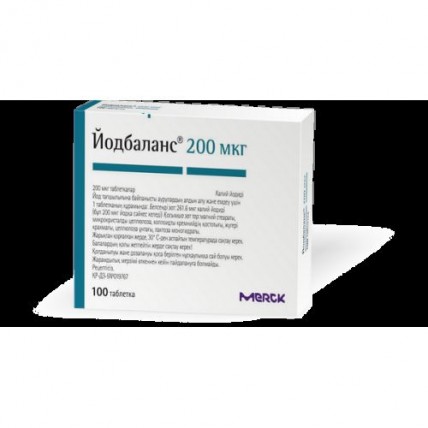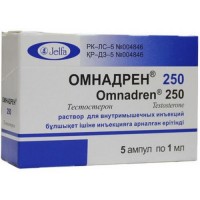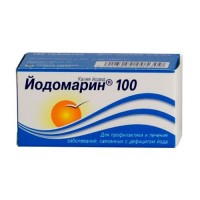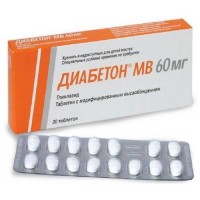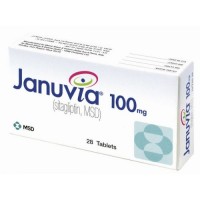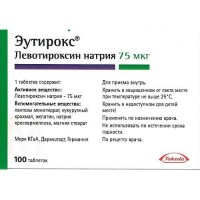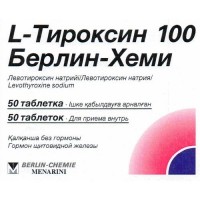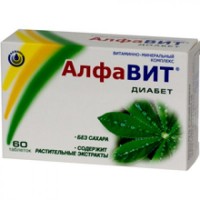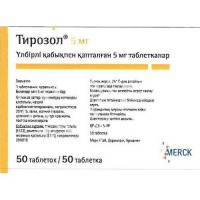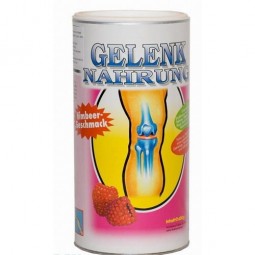Yodbalans 200 mcg (100 tablets)
- $9.10
Out Of Stock
The instruction for medical use
of YODBALANS® medicine
the Trade name
of Yodbalans®
the International unlicensed name
Is not present
the Dosage form
of the Tablet 100 mkg and 200 mkg
Structure
One tablet contains
active agent - potassium iodide of 130.8 mkg (that corresponds 100 mkg
of iodine) or 261.6 mkg (that corresponds to 200 mkg of iodine),
excipients: lactoses monohydrate, cellulose powder, starch corn, silicon dioxide colloidal, magnesium stearate, cellulose microcrystalline.
The description
of the Tablet of round shape with a flat surface from almost white till yellowish-gray color with slanted edges and risky on both parties, with the inscription I eat 33 on one party. Diameter of a tablet is 7.0–7.2 mm, thickness – 1.8–2.1 mm (dosage of 100 mkg).
Tablets of round shape with a flat surface from almost white till yellowish-gray color with slanted edges, with the inscription I eat 70 in an upper part and decorative risky in the lower part. Diameter of a tablet is 7.0–7.2 mm, thickness – 1.8–2.1 mm (dosage of 200 mkg).
Pharmacotherapeutic group
Drugs for treatment of diseases of a thyroid gland. Iodine drugs.
The ATX H03CA code Pharmacokinetics Inorganic Iodine is soaked up in a small intestine nearly 100%, and through skin – is insignificant and uncontrollable. Distribution volume at healthy people averages about 23 liters (38% of body weight). Indicators of content of inorganic iodine in blood serum usually are in an interval between 0.1 and 0.5 mkg/dl. In an organism iodide collects in a thyroid gland and other fabrics, such as sialadens, chest glands and stomach. In saliva, gastric juice and in milk the concentration of iodide is 30 times higher than its concentration in blood plasma. The removal of iodine with urine specified most often in creatinine mkg/g serves as criterion of iodic providing as in the balanced state it corresponds to daily intake of iodine with food.
The Action pharmacodynamics which renders it is exogenous the entered iodine on a human body, depend on the accepted amount of iodine in day, on a type of iodinated drug and also on a condition of a thyroid gland.
The lack of iodine leads to dysfunction of a thyroid gland and serious consequences at all stages of development of a human body, leads to an endemic craw, in hard cases to congenital cretinism.
After iodine absorption in the electrochemical way (yodination) in epithelial cells of follicles of a thyroid gland there is an oxidation by the peroxide of hydrogen (H2O2) which is kosubstraty, catalyzed by enzyme iodide-peroxidase from which elementary iodine is emitted. At the same time a part of tirozinovy groups of glucoprotein (thyreoglobulin) is iodated in provisions 3 and, partially, the 5th aromatic ring (yodization).
As a result of oxidizing condensation the iodated groups of tyrosine unite, forming a framework of a tironin. Key products are thyroxine (T4) and triiodothyronine (T3). The complex formed thus 'tironin – thyreoglobulin' is allocated as depot form of hormone of a thyroid gland in a colloid of its follicle.
Physiological amounts of iodine (up to 300 mkg) prevent formation of a craw which develops owing to an iodine deficiency, contribute to normalization of the sizes of a thyroid gland at newborns, children and teenagers and also influence a number of the broken biochemical parameters (T3/T4 coefficient, the TSH level (thyroid stimulating hormone).
Indications
- prevention of iodscarce diseases (formation of a craw), including at pregnant women and during breastfeeding
- prevention of a recurrence of a craw after its surgical removal and also upon completion of complex treatment of a craw drugs of hormones of a thyroid gland
- treatment of the diffusion euthyroid craw caused by an iodine deficiency in newborns, children, teenagers and adults
the Route of administration and doses
For prevention of development of a craw:
Newborns: 50 mkg of iodine a day. A tablet to pound, mix in 1 teaspoon of water, to wash down with a small amount of liquid.
Children: 50-100 mkg of iodine a day.
Teenagers and adults: 100-200 mkg of iodine a day.
At pregnancy and feeding by a breast: 100 - 200 mkg of iodine a day.
Prevention of a recurrence of a craw after its surgical removal or upon completion of a course of treatment drugs of hormones of a thyroid gland: 100 - 200 mkg of iodine daily.
Treatment of an euthyroid craw:
Newborns: 100 mkg of iodine a day. A tablet to pound, mix in 1 teaspoon of water, to wash down with a small amount of liquid.
Children: 100-200 mkg of iodine a day.
Teenagers: 200 mkg of iodine a day.
The daily dose of drug should be accepted in one step, after a meal, washing down with enough liquid.
Preventive reception of Yodbalansa® is quite often carried out during all life.
If at newborns after 2-4 weeks of treatment of Yodbalansom® concerning an endemic craw the reduction of the sizes of a thyroid gland is not noted, then it is possible to assume that the iodine deficiency is not a cause of illness, 6-12 months or more usually are required from children, teenagers and adults. Duration of treatment is defined by the endocrinologist.
Side effects
- in the presence of functional areas of the big sizes in a thyroid gland, the hyperthyroidism in case of use of the high doses of iodine exceeding 150 micrograms can be shown.
- development of antibodies to thyroperoxidase (AT-TPO) at the patients predisposed to autoimmune diseases is possible.
Contraindications
- a manifest hyperthyroidism
- hypersensitivity to drug components, including to iodine
- a subclinical (asymptomatic) hyperthyroidism at use of doses of iodine more than 150 micrograms a day
- toxic adenoma of a thyroid gland and also focal and diffusion autonomous disorders of a thyroid gland
Medicinal interactions
the Efficiency of treatment by anti-thyroid medicines at a concomitant use of drugs of iodine decreases.
At the combined use, perchlorate and potassium thiocyanate suppress iodine absorption by a thyroid gland. Iodine absorption by a thyroid gland and his metabolism are stimulated with thyroid stimulating hormone (TSH). Reception of Yodbalansa® in high doses along with kaliysberegayushchy diuretics can lead ment of a hyperpotassemia.
Simultaneous use of Yodbalansa® in high doses with drugs of lithium promotes development of a craw and a hypothyroidism.
Special instructions
before therapy it is necessary to exclude existence at the patient of a hyperthyroidism or a nodal toxic craw and also presence of these diseases in the anamnesis.
Before therapy it is necessary to exclude presence of diffusion or limited autonomous disorders of a thyroid gland by means of use of specific diagnostic methods as, at such treatment with use of daily doses of iodine of 150 micrograms or can lead to a hyperthyroidism above.
Saturation of a thyroid gland iodine can interfere with cumulation of the radioiodine used in the therapeutic or diagnostic purposes. In this regard administration of drug before radioiodine use is not recommended.
Appointment is not recommended to patients with the rare hereditary diseases connected with intolerance of a galactose, insufficiency of lactose or glyukozo-galaktozny malabsorption.
It is necessary to consider that against the background of therapy by drug at patients with a renal failure the development of a hyperpotassemia is possible.
Pregnancy and the period of a lactation
During the periods of pregnancy and breastfeeding the need for iodine increases therefore use of Yodbalansa® in sufficient doses for ensuring adequate intake of iodine in an organism is especially important (intake of iodine has to be not less than 200 mkg a day).
Drug gets through a placental barrier.
Drug is emitted with breast milk. It is necessary to consider iodine content in food and nutritional supplements which are applied along with drug. If the feeding woman accepts Yodbalans®, then additional prescribing of drug is not required to the babies who are on breastfeeding.
Use of drug at pregnancy and during breastfeeding is possible only in the recommended doses.
When performing therapy it is necessary to consider amount of the iodine arriving with food.
The feature of influence of medicine on ability to run the vehicle or potentially dangerous to mechanisms
does not influence.
Overdose
Symptoms: in acute intoxication iodine observes reflex vomiting, abdominal pain, diarrhea (sometimes with blood). There can come dehydration and shock. In rare instances there can be a gullet stenosis.
The chronic overdose can lead to a phenomenon of iodism: the metal taste in a mouth, swelled also inflammation mucous (rhinitis, conjunctivitis, a gastroenteritis, bronchitis), acne rash, dermatitis, hypostasis of sialadens, temperature increase, irritability, a Quincke's disease, expansion of a channel of a sialaden.
Treatment of acute overdose: gastric lavage, symptomatic treatment of disorders of water and electrolytic balance, therapy of shock.
In case of the chronic overdose caused potassium by iodide the therapy by the drug Yodbalansom® should be suspended. At the hypothyroidism caused by iodine it is necessary to cancel use of Yodbalansa® and to begin therapy with hormones of a thyroid gland. In the hyperthyroidism caused by iodine the treatment is shown by anti-thyroid means.
Seldom or never, intensive care, a plasma exchange or thyroidectomy can be required.
A form of release and packing
On 25 tablets in blister strip packaging from a film of polyvinylchloride and aluminum foil.
On 4 planimetric packs together with the instruction for medical use in the state and Russian languages put in a pack kartonnuyugosudarstvenny and Russian languages put in a pack cardboard.
Storage conditions
In the place protected from light at a temperature not above 30 °C.
To store out of children's reach!
3 years
not to apply a period of storage after expiry date.
Prescription status
Without prescription
the Producer
Merk of KGaA, Germany
the Owner of the registration certificate
of Merck Serono GmbH, Germany
the Address of the organization accepting in the territory of the Republic of Kazakhstan claims from consumers on quality of products (goods) Representative office Takeda Osteuropa Holding GmbH (Austria) in Kazakhstan Almaty, Begalin St. 136 an anomer of phone number (727) 2444004 Fax number (727) 2444005
the e-mail address of DSO-KZ@takeda.com
of YODBALANS® medicine
the Trade name
of Yodbalans®
the International unlicensed name
Is not present
the Dosage form
of the Tablet 100 mkg and 200 mkg
Structure
One tablet contains
active agent - potassium iodide of 130.8 mkg (that corresponds 100 mkg
of iodine) or 261.6 mkg (that corresponds to 200 mkg of iodine),
excipients: lactoses monohydrate, cellulose powder, starch corn, silicon dioxide colloidal, magnesium stearate, cellulose microcrystalline.
The description
of the Tablet of round shape with a flat surface from almost white till yellowish-gray color with slanted edges and risky on both parties, with the inscription I eat 33 on one party. Diameter of a tablet is 7.0–7.2 mm, thickness – 1.8–2.1 mm (dosage of 100 mkg).
Tablets of round shape with a flat surface from almost white till yellowish-gray color with slanted edges, with the inscription I eat 70 in an upper part and decorative risky in the lower part. Diameter of a tablet is 7.0–7.2 mm, thickness – 1.8–2.1 mm (dosage of 200 mkg).
Pharmacotherapeutic group
Drugs for treatment of diseases of a thyroid gland. Iodine drugs.
The ATX H03CA code Pharmacokinetics Inorganic Iodine is soaked up in a small intestine nearly 100%, and through skin – is insignificant and uncontrollable. Distribution volume at healthy people averages about 23 liters (38% of body weight). Indicators of content of inorganic iodine in blood serum usually are in an interval between 0.1 and 0.5 mkg/dl. In an organism iodide collects in a thyroid gland and other fabrics, such as sialadens, chest glands and stomach. In saliva, gastric juice and in milk the concentration of iodide is 30 times higher than its concentration in blood plasma. The removal of iodine with urine specified most often in creatinine mkg/g serves as criterion of iodic providing as in the balanced state it corresponds to daily intake of iodine with food.
The Action pharmacodynamics which renders it is exogenous the entered iodine on a human body, depend on the accepted amount of iodine in day, on a type of iodinated drug and also on a condition of a thyroid gland.
The lack of iodine leads to dysfunction of a thyroid gland and serious consequences at all stages of development of a human body, leads to an endemic craw, in hard cases to congenital cretinism.
After iodine absorption in the electrochemical way (yodination) in epithelial cells of follicles of a thyroid gland there is an oxidation by the peroxide of hydrogen (H2O2) which is kosubstraty, catalyzed by enzyme iodide-peroxidase from which elementary iodine is emitted. At the same time a part of tirozinovy groups of glucoprotein (thyreoglobulin) is iodated in provisions 3 and, partially, the 5th aromatic ring (yodization).
As a result of oxidizing condensation the iodated groups of tyrosine unite, forming a framework of a tironin. Key products are thyroxine (T4) and triiodothyronine (T3). The complex formed thus 'tironin – thyreoglobulin' is allocated as depot form of hormone of a thyroid gland in a colloid of its follicle.
Physiological amounts of iodine (up to 300 mkg) prevent formation of a craw which develops owing to an iodine deficiency, contribute to normalization of the sizes of a thyroid gland at newborns, children and teenagers and also influence a number of the broken biochemical parameters (T3/T4 coefficient, the TSH level (thyroid stimulating hormone).
Indications
- prevention of iodscarce diseases (formation of a craw), including at pregnant women and during breastfeeding
- prevention of a recurrence of a craw after its surgical removal and also upon completion of complex treatment of a craw drugs of hormones of a thyroid gland
- treatment of the diffusion euthyroid craw caused by an iodine deficiency in newborns, children, teenagers and adults
the Route of administration and doses
For prevention of development of a craw:
Newborns: 50 mkg of iodine a day. A tablet to pound, mix in 1 teaspoon of water, to wash down with a small amount of liquid.
Children: 50-100 mkg of iodine a day.
Teenagers and adults: 100-200 mkg of iodine a day.
At pregnancy and feeding by a breast: 100 - 200 mkg of iodine a day.
Prevention of a recurrence of a craw after its surgical removal or upon completion of a course of treatment drugs of hormones of a thyroid gland: 100 - 200 mkg of iodine daily.
Treatment of an euthyroid craw:
Newborns: 100 mkg of iodine a day. A tablet to pound, mix in 1 teaspoon of water, to wash down with a small amount of liquid.
Children: 100-200 mkg of iodine a day.
Teenagers: 200 mkg of iodine a day.
The daily dose of drug should be accepted in one step, after a meal, washing down with enough liquid.
Preventive reception of Yodbalansa® is quite often carried out during all life.
If at newborns after 2-4 weeks of treatment of Yodbalansom® concerning an endemic craw the reduction of the sizes of a thyroid gland is not noted, then it is possible to assume that the iodine deficiency is not a cause of illness, 6-12 months or more usually are required from children, teenagers and adults. Duration of treatment is defined by the endocrinologist.
Side effects
- in the presence of functional areas of the big sizes in a thyroid gland, the hyperthyroidism in case of use of the high doses of iodine exceeding 150 micrograms can be shown.
- development of antibodies to thyroperoxidase (AT-TPO) at the patients predisposed to autoimmune diseases is possible.
Contraindications
- a manifest hyperthyroidism
- hypersensitivity to drug components, including to iodine
- a subclinical (asymptomatic) hyperthyroidism at use of doses of iodine more than 150 micrograms a day
- toxic adenoma of a thyroid gland and also focal and diffusion autonomous disorders of a thyroid gland
Medicinal interactions
the Efficiency of treatment by anti-thyroid medicines at a concomitant use of drugs of iodine decreases.
At the combined use, perchlorate and potassium thiocyanate suppress iodine absorption by a thyroid gland. Iodine absorption by a thyroid gland and his metabolism are stimulated with thyroid stimulating hormone (TSH). Reception of Yodbalansa® in high doses along with kaliysberegayushchy diuretics can lead ment of a hyperpotassemia.
Simultaneous use of Yodbalansa® in high doses with drugs of lithium promotes development of a craw and a hypothyroidism.
Special instructions
before therapy it is necessary to exclude existence at the patient of a hyperthyroidism or a nodal toxic craw and also presence of these diseases in the anamnesis.
Before therapy it is necessary to exclude presence of diffusion or limited autonomous disorders of a thyroid gland by means of use of specific diagnostic methods as, at such treatment with use of daily doses of iodine of 150 micrograms or can lead to a hyperthyroidism above.
Saturation of a thyroid gland iodine can interfere with cumulation of the radioiodine used in the therapeutic or diagnostic purposes. In this regard administration of drug before radioiodine use is not recommended.
Appointment is not recommended to patients with the rare hereditary diseases connected with intolerance of a galactose, insufficiency of lactose or glyukozo-galaktozny malabsorption.
It is necessary to consider that against the background of therapy by drug at patients with a renal failure the development of a hyperpotassemia is possible.
Pregnancy and the period of a lactation
During the periods of pregnancy and breastfeeding the need for iodine increases therefore use of Yodbalansa® in sufficient doses for ensuring adequate intake of iodine in an organism is especially important (intake of iodine has to be not less than 200 mkg a day).
Drug gets through a placental barrier.
Drug is emitted with breast milk. It is necessary to consider iodine content in food and nutritional supplements which are applied along with drug. If the feeding woman accepts Yodbalans®, then additional prescribing of drug is not required to the babies who are on breastfeeding.
Use of drug at pregnancy and during breastfeeding is possible only in the recommended doses.
When performing therapy it is necessary to consider amount of the iodine arriving with food.
The feature of influence of medicine on ability to run the vehicle or potentially dangerous to mechanisms
does not influence.
Overdose
Symptoms: in acute intoxication iodine observes reflex vomiting, abdominal pain, diarrhea (sometimes with blood). There can come dehydration and shock. In rare instances there can be a gullet stenosis.
The chronic overdose can lead to a phenomenon of iodism: the metal taste in a mouth, swelled also inflammation mucous (rhinitis, conjunctivitis, a gastroenteritis, bronchitis), acne rash, dermatitis, hypostasis of sialadens, temperature increase, irritability, a Quincke's disease, expansion of a channel of a sialaden.
Treatment of acute overdose: gastric lavage, symptomatic treatment of disorders of water and electrolytic balance, therapy of shock.
In case of the chronic overdose caused potassium by iodide the therapy by the drug Yodbalansom® should be suspended. At the hypothyroidism caused by iodine it is necessary to cancel use of Yodbalansa® and to begin therapy with hormones of a thyroid gland. In the hyperthyroidism caused by iodine the treatment is shown by anti-thyroid means.
Seldom or never, intensive care, a plasma exchange or thyroidectomy can be required.
A form of release and packing
On 25 tablets in blister strip packaging from a film of polyvinylchloride and aluminum foil.
On 4 planimetric packs together with the instruction for medical use in the state and Russian languages put in a pack kartonnuyugosudarstvenny and Russian languages put in a pack cardboard.
Storage conditions
In the place protected from light at a temperature not above 30 °C.
To store out of children's reach!
3 years
not to apply a period of storage after expiry date.
Prescription status
Without prescription
the Producer
Merk of KGaA, Germany
the Owner of the registration certificate
of Merck Serono GmbH, Germany
the Address of the organization accepting in the territory of the Republic of Kazakhstan claims from consumers on quality of products (goods) Representative office Takeda Osteuropa Holding GmbH (Austria) in Kazakhstan Almaty, Begalin St. 136 an anomer of phone number (727) 2444004 Fax number (727) 2444005
the e-mail address of DSO-KZ@takeda.com
